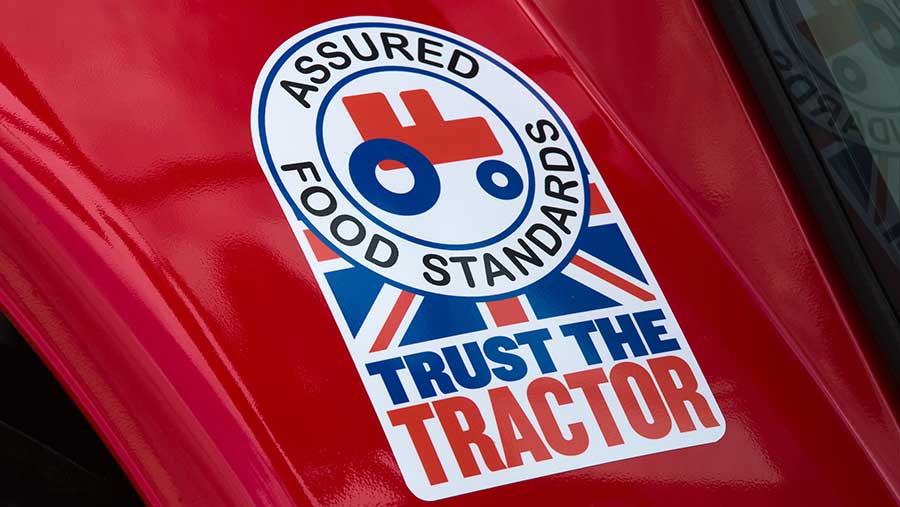Red Tractor standards update: what farmers must do
 © Tim Scrivener
© Tim Scrivener Farmers signed up to Red Tractor assurance will have to prepare for new standards which come into in force from October.
Over the next three months, each sector will have to get in line with tweaked benchmarks, as part of the latest triennial review.
Some standards will apply to all farmers, but Red Tractor has also made some specific changes, so producers will have to study their new benchmarks carefully.
See also: Red Tractor boss spells out benefits of the scheme
The headline changes for each sector are:
Beef and lamb
- A new recommendation is that highest priority critically important antibiotics (HP-CIAs) should only be used as a last resort, under the direction of a vet.
- For farm-to-farm sales, any animals going through a withdrawal period must take with them a withdrawal period declaration.
- Farms must draw up and implement a biosecurity plan which covers risks such as incoming stock, vehicles and visitors.
- All disinfectants used across the farm should be Defra-approved.
Combinable crops and sugar beet
- A new section has been introduced for the few British growers who irrigate combinable crops or sugar beet. The rules aim to stop crops being contaminated and too much water being used. For example, farmers should not use untreated sewage water on crops and irrigation must be based on an identified need.
- The standards now deal with temporary storage of grain outside. This is only allowed in “exceptional circumstances”, like a store or dryer breakdown, and for five days at most, unless a derogation has been sought. Grain has to be covered when not being worked and kept on a sealed, impervious surface.
Dairy
- Medicine records must now include a collation of all antibiotics used each year on the farm. A vet must carry out an annual review of their usage.
- As with beef and lamb, animals under a withdrawal period sold to another farm must be accompanied by a declaration.
- Any chemicals and cleaning agents in the parlour, along with udder and hoof care products, must not contain quaternary ammonium compounds.
- A documented system should be in place to make sure that calves receive enough colostrum as soon as possible after birth but within six hours.
- Silage stores must minimise the risk of contamination and pollution.
Fresh produce
- More detailed risk assessments are needed for packhouses and fields, in order to stop product contamination.
- Crops have been divided up into four categories for risk assessments. For example, potatoes must be assessed differently to lettuces.
- A water risk assessment for all crop categories is necessary, which must cover all water used in production.
Pigs
- All antibiotics used, including in-feed, should be collated and uploaded each quarter to AHDB Pork’s electronic medicine book. This year, data from 1 April to 30 September should be submitted by 11 November. Every quarter, vets must also sign a declaration that they are prescribing antibiotics in accordance with the Pig Veterinary Society’s principles. Any use of class three antibiotics have to be justified and that justification recorded.
- If a piglet has to be removed from a sow for welfare reasons at younger than 21 days, a vet has to check that the management of supplementary rearing accommodation is satisfactory.
- Units must create an action plan to cope with unweaned piglets over two weeks where the sow’s milk is not enough for their water needs and where water is not always available. In growing and finishing units, drinkers integral to wet-and-dry feeding systems do not count as a separate water source. Non-mains water has to be tested independently each year.
- Routine, multiple ear notching is not allowed. It can be used only as a last resort in pedigree breeding, where pig colouring prevents tattooing.
- Imported stock and semen must be tested as part of the National Pig Association’s imports protocol for non-statutory diseases. The farm’s vet must sign a statement confirming this.
Poultry
- Antibiotics should only be used on broiler units to treat a problem and total usage should be recorded in mg per population correction unit (mg/pcu). Third and fourth-generation cephalosporins, glycopeptides and colistin are not allowed, but macrolides and fluoroquinolones are, as long as the vet and the customer has agreed.
- Hatcheries which are Red Tractor approved should only handle assured eggs.
- Farmers should keep records of how and when they treated home-grown grains for salmonella before feeding.
All sectors
- No major details have changed for environmental protection, but the rules have been divided into two sections: use of agri-chemicals and nutrient management.
- For rodenticides, permanent baiting cannot be done routinely and baits can only be placed where evidence shows they are “continuously effective”. Before treatment, farmers should undertake a site survey and risk assessment of watercourses and non-target species.
